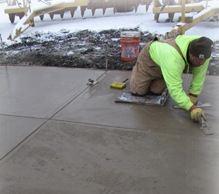 POMPANO BEACH, Fla. — Scientists from Blue World Crete recently completed a month of lab testing and demonstrations with some of Colombia’s largest concrete producers and consumers for what company officials are calling an entirely green alternative for Portland cement.
POMPANO BEACH, Fla. — Scientists from Blue World Crete recently completed a month of lab testing and demonstrations with some of Colombia’s largest concrete producers and consumers for what company officials are calling an entirely green alternative for Portland cement.
Samples of the new Geo-Blue Crete II were tested with producers Holcim, Cemex, Argos, and consumers Tequendama, Concreto and Colombia Groupa, as well as at independent labs located in Medellin, Colombia and in the U.S.
The scientists from the U.S. company demonstrated the concrete quality with the goal of getting Colombia to be the first country to go “blue.”
The company slogan, which is “Go Green, Think Blue,” reflects the concept of being truly green, said Art Galietti, chief operating officer of Blue World Crete Inc.
"In the myriad of companies claiming to be green, the whole concept of ‘green’ has been watered down and, in some cases, companies have made incorrect claims of their ecological impact,” he said. “Whereas, Geo-Blue Crete is ‘green’ from birth and remains ‘green’ right to the end consumer.”
The low carbon footprint cement is a hybrid between a geopolymer and a nanoceramic, with a bonding process stronger than in the case of Portland cement encapsulating normal aggregate material such as sand and stone, according to the company.
Tested under American Society for Testing and Materials standards with results that company officials say proves it to be superior, the product has an early rise in compression strength, 3000 psi in three days and in 28 days yields a concrete product which tests over 6,000 psi.
The company’s concrete is monolithic, has three times the tensile strength of Portland, and is acid-, alkali-, salt-, fire- and heat-retardant.
While Portland cement is porous and absorbs water, Geo-Blue Crete is waterproof, officials said.
"We are expecting a new paradigm in the construction industry to emerge with Geo-Blue Crete II front and center," Galietti. Said. “A Portland cement plant costs about $150 to $200 million U.S. dollars. Our plants are portable, have no kilns and cost about $3 million U.S. dollars, fully equipped and turn-key.”
Galiette added that there is no longer a need for limestome quarries or giant kilns releasing carbon dioxide into the air, along with other heavy metal contaminants.
The company is currently in negotiations with companies in Australia, Brazil, Canada, the Philippines, Ukraine, Dubai, and in the U.S.

